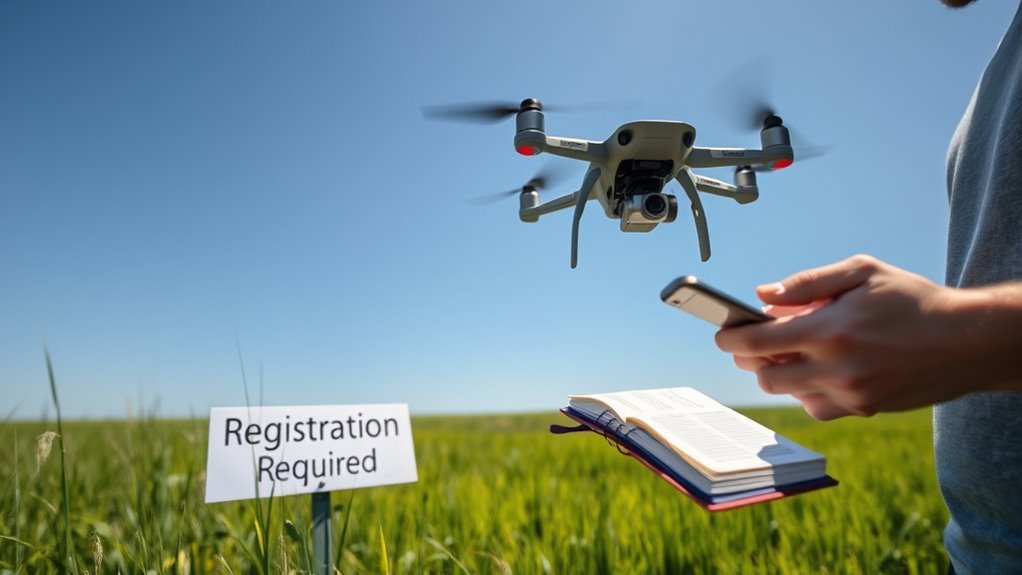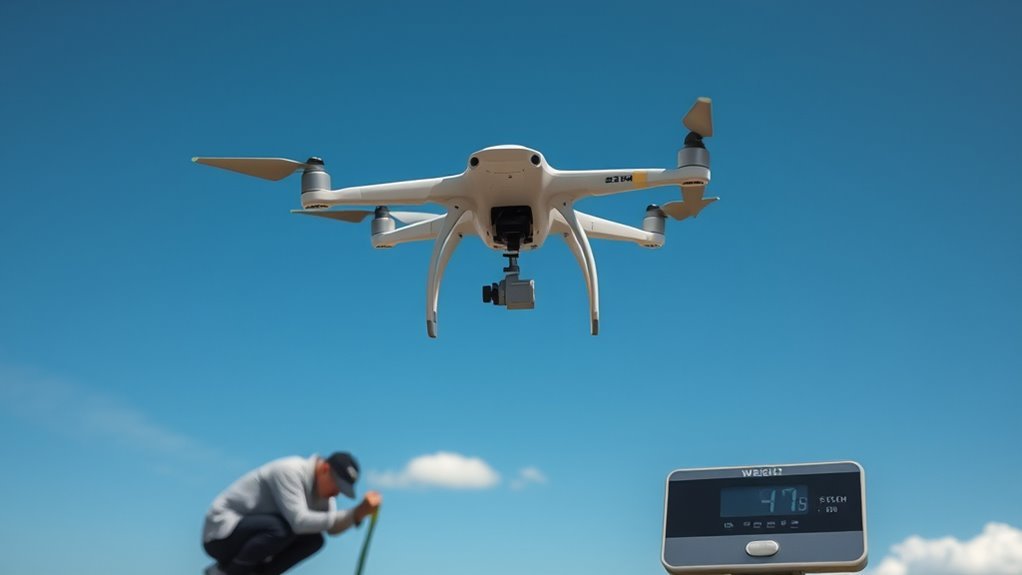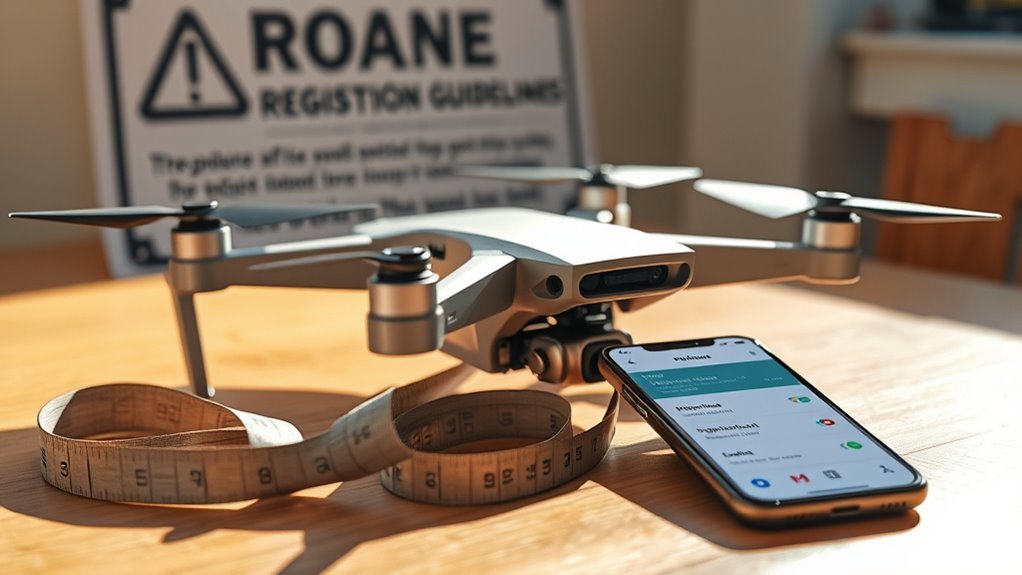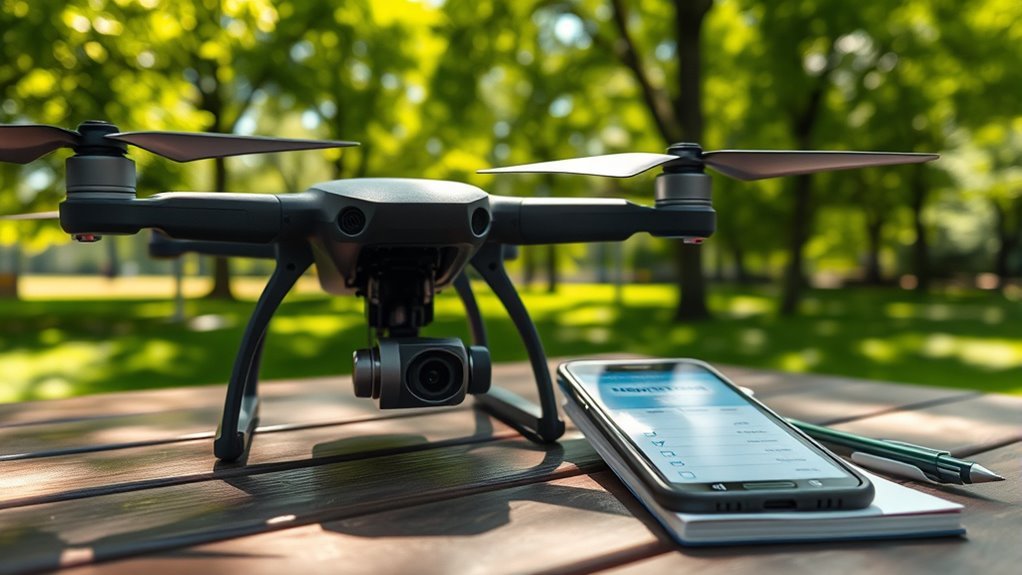To determine if your drone needs registration, check its weight and intended use. If your drone weighs over 0.55 pounds, it must be registered with the FAA, regardless of whether it’s for recreational or commercial purposes. Drones below this weight may not require registration, but exceptions exist. Understanding these requirements is essential to avoid penalties. Explore the nuances of registration and compliance to guarantee you’re fully informed about operating your drone legally and responsibly.
Understanding Drone Registration Requirements

What do you need to know about drone registration requirements? Understanding these regulations is crucial for maintaining drone safety while enjoying your aerial freedom. In the U.S., drones weighing over 0.55 pounds must be registered with the FAA. This registration helps guarantee regulatory compliance, reducing risks associated with unregulated flight. You’ll need to provide your contact information and pay a small fee, which supports safety enforcement measures. Failure to register can lead to fines and legal repercussions, impacting your ability to fly freely. By adhering to these requirements, you contribute to a safer environment for all drone operators and help foster a culture of responsible flying. Ultimately, staying informed about registration is essential for your operational freedom. Additionally, compliance with FAA regulations ensures that drone operations are conducted safely and responsibly, facilitating innovation in the industry.
Weight Classifications and Their Impact on Registration

Understanding drone weight classifications is essential for determining registration requirements, as regulations vary markedly based on these categories. You’ll find that lighter drones often face less stringent registration criteria, while heavier models typically require more thorough documentation. This distinction not only affects compliance but also impacts operational capabilities and responsibilities.
Drone Weight Categories
As drone technology evolves, the classification of drones by weight has become essential for determining registration requirements. Understanding drone types and their respective weight thresholds is vital for compliance. Generally, drones fall into three primary categories: lightweight, medium, and heavyweight. Each category has specific implications for registration.
| Weight Category | Weight Threshold (lbs) | Registration Requirement |
|---|---|---|
| Lightweight | 0 – 0.55 | May not require registration |
| Medium | 0.56 – 55 | Generally requires registration |
| Heavyweight | Over 55 | Usually requires registration |
Registration Requirements Overview
Drone registration requirements vary greatly based on weight classifications, which directly influence compliance obligations for operators. In the U.S., drones weighing under 0.55 pounds (250 grams) typically don’t require registration, providing a level of freedom for hobbyists. Conversely, those exceeding this weight must adhere to FAA regulations, necessitating registration and marking. This registration impact analysis highlights how weight affects not just compliance but also operational flexibility. Understanding this drone regulations overview is essential for operators seeking to navigate legal landscapes while maximizing their flight potential. Ensuring you’re informed about weight categories can help you avoid penalties and maintain the liberty to fly your drone as intended. Always stay updated, as regulations can evolve, impacting your registration obligations.
Recreational vs. Commercial Use: What You Need to Know

Registration: Recreational flying often requires different registration than commercial operations. Drones over a specific weight threshold must be registered with the Icelandic Transport Authority to ensure compliance with local regulations.
Pilot Certification: Commercial operators must obtain specific certifications, unlike recreational flyers.
Operational Limits: Each category has unique altitude and airspace restrictions.
Insurance Requirements: Commercial operations typically necessitate liability insurance, while recreational use may not.
Technological Compliance: Understanding the regulatory frameworks for drone operations is crucial for ensuring safe and legal usage across both categories. Additionally, knowledge of local laws helps avoid fines or drone confiscation, which is essential for responsible flying.
Exceptions to Registration Rules
Although most drones require registration, there are notable exceptions that can ease the burden for certain users. Military drones, for instance, are exempt from registration due to their operational nature and oversight by government entities. Additionally, toy drones weighing less than 0.55 pounds (250 grams) generally don’t need to be registered. This exemption allows enthusiasts to enjoy flying without the administrative hassle, promoting accessibility to the hobby. However, users should remain aware of local regulations, as they can vary. Understanding these exceptions is essential for maintaining compliance while maximizing your freedom to operate drones effectively. Always check the latest guidelines to verify your drone use aligns with current laws and standards.
How to Register Your Drone
To register your drone, you’ll first need to understand the specific requirements that apply to your situation. The registration process involves several clear steps, and being aware of common mistakes can save you time and frustration. Let’s examine these aspects to guarantee your registration is successful.
Registration Requirements Overview
Understanding the registration requirements for your drone is essential, as failing to comply can lead to significant penalties. An extensive drone regulations overview emphasizes the importance of registration, which not only keeps you compliant but also offers numerous registration benefits.
Consider the following points:
- Legal Compliance: Stay within federal and state laws.
- Safety Assurance: Enhances airspace safety and accountability.
- Insurance Eligibility: Facilitates access to liability insurance options.
- Resale Value: Increases your drone’s marketability if registered.
Step-by-Step Registration Process
Registering your drone involves a straightforward process that typically requires just a few key steps. First, visit the FAA website to access the drone registration forms, which are essential for compliance. Fill out the required information accurately, guaranteeing you meet the specific criteria based on your drone’s weight and intended use. Next, submit your forms online, accompanied by the appropriate registration fee. Once submitted, the registration timeline is usually quick, with confirmation often received within a few days. After receiving your registration number, affix it to your drone as mandated. This process not only guarantees legal compliance but also affirms your commitment to responsible drone operation, enhancing your freedom to fly without regulatory concerns.
Common Registration Mistakes
While the registration process may seem straightforward, many drone operators make common mistakes that can lead to delays or even fines. Understanding these registration errors can help you navigate the process more effectively. Here are some prevalent misconceptions to avoid:
- Failing to register before the flight
- Incorrectly classifying your drone’s weight
- Using outdated forms or information
- Neglecting to keep your registration current
Consequences of Failing to Register
Failing to register your drone can lead to significant legal repercussions, as non-compliance with federal regulations may result in hefty fines. You could face legal penalties ranging from $250 to $27,500 per violation, depending on the severity of the infraction. Furthermore, if you cause an incident or damage while flying an unregistered drone, the financial consequences could escalate dramatically. Liability for damages incurred can place you at risk for substantial compensation claims. In addition, repeated offenses may result in criminal charges, including the potential for jail time. It’s essential to understand that neglecting registration not only jeopardizes your freedom to fly but also imposes unnecessary risks to your financial stability. Prioritize compliance to safeguard your interests.
Frequently Asked Questions
Do International Drone Laws Affect U.S. Registration Requirements?
International drone regulations can influence U.S. registration requirements, as compliance with global standards may be necessary for seamless operation. Understanding these connections helps you navigate legal landscapes while maintaining your freedom to fly responsibly.
Can I Register My Drone Online?
Yes, you can register your drone online if it meets the eligibility criteria set by regulatory authorities. Make certain you have all necessary details ready, as online registration streamlines the process and enhances your operational freedom.
Is There a Registration Fee for Drones?
When considering drone registration, you’ll find that yes, there are registration fees involved. The cost varies based on the drone’s specifications, emphasizing the importance of understanding these fees to maintain your operational freedom.
What Information Is Needed for Registration?
To complete the registration process, you’ll need your drone specifications, including its make, model, weight, and serial number. This information guarantees compliance and helps you maintain the freedom to operate your drone legally and responsibly.
How Long Does the Registration Process Take?
The registration timeline typically spans a few hours to a few days, depending on the application process you choose. Make certain all necessary information is accurate to expedite your registration and enjoy flying with minimal delays.

